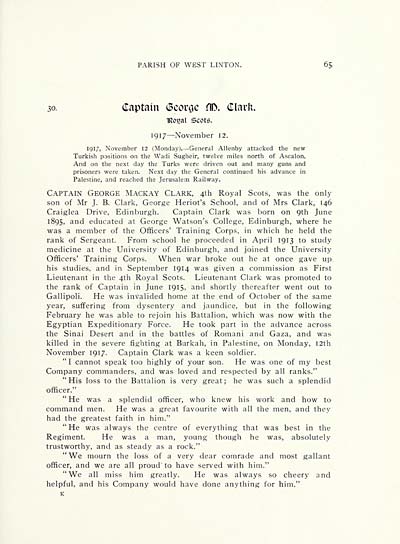Download files
Complete book:
Individual page:
Thumbnail gallery: Grid view | List view

PARISH OF WEST LINTON. . 6S
30. Captain 6coroc fll>. Clark.
lRov?al Scots.
1917 — November 12.
1917, November 12 (Monday). — General AUenby attacked the new
Turkish positions on the Wadi Sugheir, twelve miles north of Ascalon.
And on the next day the Turks were driven out and many guns and
prisoners were taken. Next day the General continued his advance in
Palestine, and reached the Jerusalem Railway.
Captain George Mackay Clark, 4th Royal Scots, was the only
son of Mr J. B. Clark, George Heriot's School, and of Mrs Clark, 146
Craiglea Drive, Edinburgh. Captain Clark was born on 9th June
1895, and educated at George Watson's College, Edinburgh, where he
was a member of the Officers' Training Corps, in which he held the
rank of Sergeant. From school he proceeded in April 1913 to study
medicine at the University of Edinburgh, and joined the University
Officers' Training Corps. When war broke out he at once gave up
his studies, and in September 1914 was given a commission as First
Lieutenant in the 4th Royal Scots. Lieutenant Clark was promoted to
the rank of Captain in June 1915, and shortly thereafter went out to
Gallipoli. He was invalided home at the end of October of the same
year, suffering from dysentery and jaundice, but in the following
February he was able to rejoin his Battalion, which was now with the
Egyptian Expeditionary Force. He took part in the advance across
the Sinai Desert and in the battles of Romani and Gaza, and was
killed in the severe fighting at Burkah, in Palestine, on Monday, l2th
November 1917. Captain Clark was a keen soldier.
"I cannot speak too highly of your son. He was one of my best
Company commanders, and was loved and respected by all ranks."
"His loss to the Battalion is very great; he was such a splendid
officer."
"He was a splendid officer, who knew his work and how to
command men. He was a great favourite with all the men, and they
had the greatest faith in him."
"He was always the centre of everything that was best in the
Regiment. He was a man, young though he was, absolutely
trustworthy, and as steady as a rock."
"We mourn the loss of a very dear comrade and most gallant
officer, and we are all proud' to have served with him."
"We all miss him greatly. He was always so cheery and
helpful, and his Company would have done anything for him."
K
30. Captain 6coroc fll>. Clark.
lRov?al Scots.
1917 — November 12.
1917, November 12 (Monday). — General AUenby attacked the new
Turkish positions on the Wadi Sugheir, twelve miles north of Ascalon.
And on the next day the Turks were driven out and many guns and
prisoners were taken. Next day the General continued his advance in
Palestine, and reached the Jerusalem Railway.
Captain George Mackay Clark, 4th Royal Scots, was the only
son of Mr J. B. Clark, George Heriot's School, and of Mrs Clark, 146
Craiglea Drive, Edinburgh. Captain Clark was born on 9th June
1895, and educated at George Watson's College, Edinburgh, where he
was a member of the Officers' Training Corps, in which he held the
rank of Sergeant. From school he proceeded in April 1913 to study
medicine at the University of Edinburgh, and joined the University
Officers' Training Corps. When war broke out he at once gave up
his studies, and in September 1914 was given a commission as First
Lieutenant in the 4th Royal Scots. Lieutenant Clark was promoted to
the rank of Captain in June 1915, and shortly thereafter went out to
Gallipoli. He was invalided home at the end of October of the same
year, suffering from dysentery and jaundice, but in the following
February he was able to rejoin his Battalion, which was now with the
Egyptian Expeditionary Force. He took part in the advance across
the Sinai Desert and in the battles of Romani and Gaza, and was
killed in the severe fighting at Burkah, in Palestine, on Monday, l2th
November 1917. Captain Clark was a keen soldier.
"I cannot speak too highly of your son. He was one of my best
Company commanders, and was loved and respected by all ranks."
"His loss to the Battalion is very great; he was such a splendid
officer."
"He was a splendid officer, who knew his work and how to
command men. He was a great favourite with all the men, and they
had the greatest faith in him."
"He was always the centre of everything that was best in the
Regiment. He was a man, young though he was, absolutely
trustworthy, and as steady as a rock."
"We mourn the loss of a very dear comrade and most gallant
officer, and we are all proud' to have served with him."
"We all miss him greatly. He was always so cheery and
helpful, and his Company would have done anything for him."
K
Set display mode to: Large image | Transcription
Images and transcriptions on this page, including medium image downloads, may be used under the Creative Commons Attribution 4.0 International Licence unless otherwise stated. ![]()
| Rolls of honour > Places > Book of remembrance for Tweeddale > Parish of West Linton > (77) |
|---|
| Permanent URL | https://digital.nls.uk/101001167 |
|---|
| Attribution and copyright: |
|
|---|---|
| Description | Arranged alphabetically by first-named place, starting with Aberdeen. |
|---|

